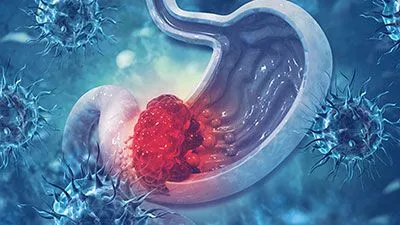Stomach cancer, also known as gastric cancer, is a serious and potentially life-threatening disease that develops when cancer cells form in the lining of the stomach. While it is not as common as some other types of cancer, it is essential to be aware of its warning signs, symptoms, and treatment options. In this comprehensive guide, we will explore the first warning signs of this condition, three common symptoms to watch out for, how this disease starts, and the prospects of its curability.
Early Warning Signs of Stomach Cancer
Recognizing the early warning signs of stomach cancer is crucial for timely diagnosis and treatment. Here are some symptoms that may indicate the presence of stomach cancer:
Unexplained Weight Loss
One of the first signs of stomach cancer can be unexplained weight loss. If you find yourself shedding pounds without trying, it is essential to consult a healthcare professional. Sudden and unintentional weight loss may be indicative of an underlying health issue, including stomach cancer.
Persistent Indigestion
Persistent indigestion or dyspepsia is another warning sign of stomach cancer. While occasional indigestion is common, if you experience recurring indigestion, especially if it is accompanied by other symptoms, it is important to seek medical advice. This can affect the normal functioning of the digestive system, leading to chronic indigestion.
Abdominal Pain or Discomfort
Abdominal pain or discomfort, particularly in the upper abdomen, can be an early symptom of this problem. The pain may come and go initially but can become more persistent as the cancer progresses. If you have persistent abdominal pain that is not alleviated by over-the-counter medications, consult a healthcare professional for evaluation.
Three Common Symptoms of Stomach Cancer
In addition to the early warning signs, there are several common symptoms associated with this problem. These symptoms often become more noticeable as the disease advances. Here are three of the most prevalent symptoms:
Blood in Stool or Vomit
One of the most alarming symptoms of this condition is the presence of blood in the stool or vomit. This can manifest as black, tarry stools (melena) or vomit that resembles coffee grounds. Blood in these bodily fluids indicates internal bleeding, which can occur when stomach cancer invades the blood vessels in the lining.
Loss of Appetite and Feeling Full Quickly
Stomach cancer can affect your appetite and the way you eat. Many individuals with this condition experience a loss of appetite, leading to unintended weight loss. Additionally, you may feel full quickly, even after consuming small amounts of food. This sensation of early fullness, known as early satiety, is a common symptom of this disease.
Fatigue and Weakness
As stomach cancer progresses, it can lead to fatigue and weakness. This is often the result of anemia, which occurs when this problem causes bleeding in the stomach. Anemia reduces the number of red blood cells in the body, leading to fatigue, weakness, and pale skin.
How Does Stomach Cancer Start?
Understanding how it develops is essential for early detection and prevention. Stomach cancer typically begins with changes in the cells of the stomach lining. Here’s how it starts:
Precancerous Changes
It often starts with precancerous changes in the lining of the stomach. These changes are usually caused by factors such as chronic infection with Helicobacter pylori (H. pylori) bacteria, long-term inflammation of the stomach (gastritis), or the presence of certain stomach polyps. Over time, these precancerous changes can progress to cancer if left untreated.
Development of Tumors
As the precancerous cells continue to mutate and grow, they can form tumors in the stomach lining. These tumors can be benign (non-cancerous) or malignant (cancerous). Malignant tumors can invade nearby tissues and spread to other parts of the body, a process known as metastasis.
Metastasis
Metastasis is a critical stage in the progression of stomach cancer. Cancer cells from the stomach can travel through the bloodstream or lymphatic system to other organs, such as the liver, lungs, or lymph nodes. Once cancer has spread to distant organs, it becomes more challenging to treat and cure.

Is Stomach Cancer Highly Curable?
The curability of stomach cancer depends on several factors, including the stage at which it is diagnosed, the extent of its spread, and the overall health of the patient. While it can be challenging to treat, advancements in medical technology and treatments have improved the prognosis for some patients.
Early Diagnosis
Early-stage stomach cancer is more likely to be curable. When it is detected at an early stage, before it has spread to other organs or tissues, it is often possible to remove the cancerous tissue through surgery. In some cases, this may be the only treatment needed.
Advanced Stages
In advanced stages of this condition, when the disease has spread beyond the stomach, treatment becomes more complex. Treatment options may include a combination of surgery, chemotherapy, radiation therapy, targeted therapies, and immunotherapy. While these treatments can help manage the disease and extend survival, they may not always result in a cure.
Prognosis
The prognosis for stomach cancer varies widely from person to person. Survival rates depend on factors such as the stage of cancer, the type of treatment received, and the overall health of the patient. It’s important to work closely with healthcare professionals to develop a personalized treatment plan and to discuss the expected outcomes.
Stomach cancer is a serious condition that requires prompt attention and care. Understanding the early warning signs and common symptoms can help with early detection, potentially improving the chances of successful treatment. While it can be challenging to cure, advancements in medical science offer hope to those affected by this disease. If you or a loved one experience any of the symptoms mentioned in this article, it is crucial to consult a healthcare professional for a thorough evaluation and diagnosis. Early detection and appropriate treatment are key factors in improving the prognosis for individuals with this condition.